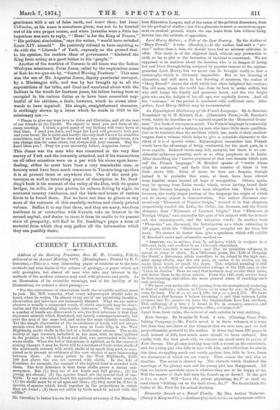An Etymological Dictionary of the French Language. By A. Brachet.
Translated by G. W. Kitchin, M.A. (Clarendon Prees.)—M. Braclaet's work, which he describes as "a natural sequel to the 'Historical Gram- mar," is a book of uncommon merit. The French language is commonly taught in so empirical a fashion, by men who have little more qualifica- tion as its teachers than the accident which has made it their mother- tongue, that a volume which helps to give a scientific character to the study of it is of special value. Etymological researches into French words have the advantage of being conducted, for the most part, in a terra cognita. Isolated words may defy analysis, but there is no con- siderable unknown quantity, such as so often perplexes us in Latin. After describing the "known provinces of that vast domain which men call the French language," M. Drachet speaks of "words whose origin is unknown," and finds that the number of these is but little above 650. Even of these he does not despair, though indeed it is probable that some, at least, have been altered from familiar stems beyond all hope of recognition. Others, again, may be sprang from Latin words, which, never having found their way into literary language, have been altogether lost. There is left, however, the vastly larger portion of the language the origin of which can be shown almost to demonstration. Our author discusses con- secutively "Elements of Popular Origin," treated of in four chapters, respectively headed the Latin, the Celtic, the German, and the Greek element ; then "Elements of Learned Origin," then "Elements of Foreign Origin," and concludes this part of his subject with the histori- cal, the onomatopoetic, and the unknown words. In another book "Phonetics" are discussed, the Introduction as a whole extending to 126 pages, while the "Dictionary" proper occupies not far from 400 more. We cannot do better than give a specimen which will exhibit M. Brachet's exact and exhaustive method :— "Aiuuvxjs, vn., to arrive ; from L. adripare, which is anipare in a 9th-cent, text, and aft ibare in an 11th-cent. chartulary.
"Arriver was first a sea-term ; and like its primitive adripare, it meant to come to shore. In a 12th-cent, poem, the 'Life of Gregory the Great,' a fisherman pilots travellers to an island in the high sea ; after many efforts, says the old poet, au rocker it les arrive, i.e., he made them touch or reach the shore. This original meaning is still visible in a collection of administrative rulings of the 13th cent. in the ‘Livre de Justice.' Here we read that boatmen may arriver their boats, and fasten them to the trees ashore. From the 14th cent, arriver loses its first meaning, and takes the more general sense of reaching one's end, arriving.
"We have seen under alter the passing from the metaphor of seafaring to that of walking ; adnare, in Cicero, = to come by sea • in Papias, to come by land. For dr = rr, see § 108; for p = v, see § 111. We have seen that p first became b before becoming v, and that between Latin arripare and Fr, arriver we have the intermediate Low Lat. arribare. This softening of p into v is found in Fr. in assopire, assouvir, and puree (0. Fr., pevree), from pipraia,—Der., arrivage,—ee."
Apart from their value, the interest of such articles is very striking.


































 Previous page
Previous page